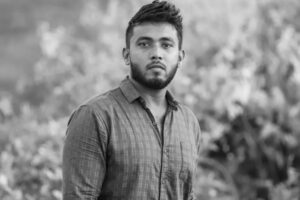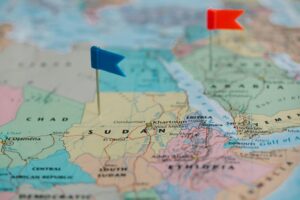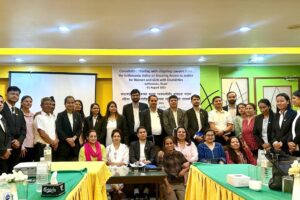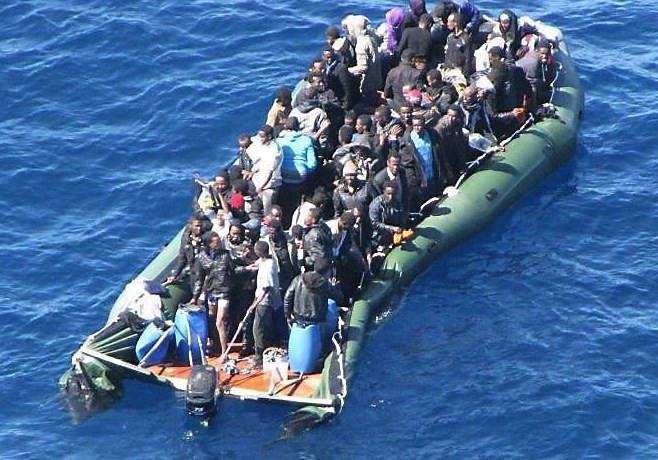
Nov 17, 2016 | Événements, Multimédia, Nouvelles
7ème Forum annuel de juges et avocats à Genève, 17-18 Novembre 2016
Le septième Forum annuel de juges et avocats, qui aura lieu à Genève les 17 et 18 novembre 2016, réunira juges et avocats provenant du monde entier, ainsi que les agences des Nations Unies concernées à Genève, afin de discuter du rôle des juges et des avocats dans les situations de déplacements massifs de réfugiés et de migrants.
Les participants réfléchiront aux défis pratiques, juridiques et de nature politique soulevés par les mouvements contemporains de réfugiés et de migrants actuels, perçus comme exceptionnels par leur ampleur et leur rapidité.
Les situations particulières considérées visent notamment celles en Europe (avec des personnes venant principalement de et par l’Afrique du Nord et le Moyen-Orient, y-compris la Syrie, l’Erythrée, l’Irak et l’Afghanistan); des Amériques (y-compris des personnes se rendant aux États-Unis d’Amérique depuis l’Amérique centrale et l’Amérique du Sud); en Asie (en particulier concernant les Rohingyas à travers l’Asie du Sud-Est, ainsi que les pratiques migratoires impliquant l’Australie et le Pacifique); et à l’intérieur et en provenance de parties de l’Afrique sub-saharienne.
Dans la plupart de ces situations, les protections juridiques disponibles et les rôles respectifs des pouvoirs exécutif, législatif et judiciaire pour la garantie de ces protections, ont fait l’objet de débats.
Les autorités du monde entier ont été confrontés au défi de s’assurer qu’en toutes circonstances, les individus puissent avoir accès à des procédures équitables et effectives vis-à-vis toutes décisions clés relatives à leurs droits et intérêts tels que: les déterminations relatives au droit d’une personne à la protection internationale, notamment les déterminations relatives au statut de réfugié; les décisions concernant la détention ou les poursuites pénales fondées sur l’entrée ou à la présence d’une personne dans le pays; et les décisions concernant l’expulsion ou le transfert ultérieur.
Dans certains cas, les gouvernements se sont radicalement éloignés des procédures ordinaires. Le cadre de « crise » ou d’« urgence » a été de plus en plus invoqué, parfois, afin de réduire les protections et garanties judiciaires et l’accès à la justice.
Le Forum entend se concentrer en particulier sur le rôle des juges et des avocats dans la garantie des droits procéduraux des individus dans de telles situations, et dans l’examen de la constitutionnalité et de la légalité internationale des législations, politiques et pratiques nationales pertinentes.
Les participants au Forum seront invités à analyser les cadres juridiques et des politiques ainsi que les pratiques en la matière aux niveaux national, régional et universel, et à formuler des recommandations sur le rôle spécifique des juges et des avocats dans ces situations, y-compris, à l’égard des pouvoirs exécutif et législatif.
Le principal résultat du Forum sera un ensemble de Principes sur le rôle des juges et des avocats dans les situations de mouvements massifs de réfugiés et de migrants. Les Principes seront élaborés par la CIJ, et ils ne seront pas être attribués aux participants du Forum.
Ces Principes viseront à compléter le Guide des praticiens de la CIJ n°6 de 2011 sur la migration et le droit international des droits de l’Homme.
fr-programme-2016gf-09-11-2016 (Texte complet en PDF)
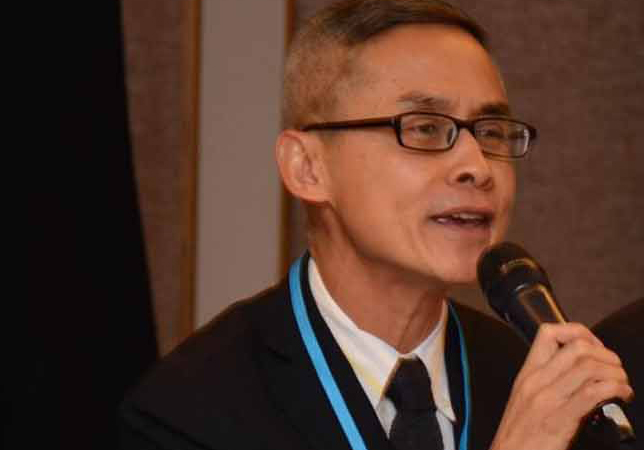
Nov 11, 2016 | News
The ICJ today condemned efforts by a group of States led by the African Group of the UN Members States to halt the work of the UN Independent Expert charged with protecting people from discrimination and violence based on sexual orientation and gender identity (SOGI).
The organization said that the move constituted an unwarranted interference with the independence and capacity of the Human Rights Council to discharge its mandate for the promotion and protection of all human rights and fundamental freedoms for all, without discrimination.
On 3 November 2016 Botswana on behalf of the African Group introduced a draft resolution before the Third Committee of the UN General Assembly in New York questioning the authority for the mandate of the Independent Expert Vitit Muntarbhorn (photo) and deferring action indefinitely on confirming the mandate’s establishment.
The ICJ is calling on the African Group to withdraw its draft resolution.
If a vote on the resolution does go ahead, the ICJ said that States must resoundingly reject it and send a signal to the world that the rights of all persons must be protected on an equal basis and that the UN Human Rights Council is capable of acting to secure such protection.
The ICJ considers that adoption of the resolution would represent a dramatic setback to the Human Rights Council’s efforts to tackle violence and discrimination based on SOGI.
Each year, the Third Committee of the UN General Assembly considers the Human Rights Council’s annual report.
This year, that report contains Human Rights Council resolution 32/2 on Protection against violence and discrimination based on sexual orientation and gender identity.
The Human Rights Council’s adoption of resolution 32/2 on 30 June 2016 made history by establishing the first-ever mandate of an Independent Expert of the Human Rights Council on protection against violence and discrimination based on SOGI.
In September this year the Human Rights Council appointed Prof. Vitit Muntarbhorn of Thailand to discharge this mandate.
Since then, Prof. Muntarbhorn has duly taken up his position and has begun fulfilling this work.
The draft resolution that the African Group has tabled at the Third Committee questions the basis in international law for the establishment of the Independent Expert’s mandate on SOGI and seeks to defer action on Human Rights Council resolution 32/2 indefinitely.
Since the Human Rights Council was set up in 2006, none of its resolutions mandating the establishment of a Special Procedure has ever been challenged by the General Assembly.
The ICJ considers that the adoption of the African Group’s resolution would set an extremely detrimental and regressive precedent by blocking the Human Rights Council from carrying out its own mandate.
It would undermine the UN’s preeminent human rights body’s overall authority by sapping its independence and ability to fulfil its mandate for the promotion and human rights for all without discrimination as it sees fit.
Contact
Livio Zilli, ICJ Senior Legal Adviser and UN Representative, t: +41 22 979 38 23 ; e: livio.zilli(a)icj.org
Read also
What is the Future of the SOGI Mandate and What Does it Mean for the UN Human Rights Council?
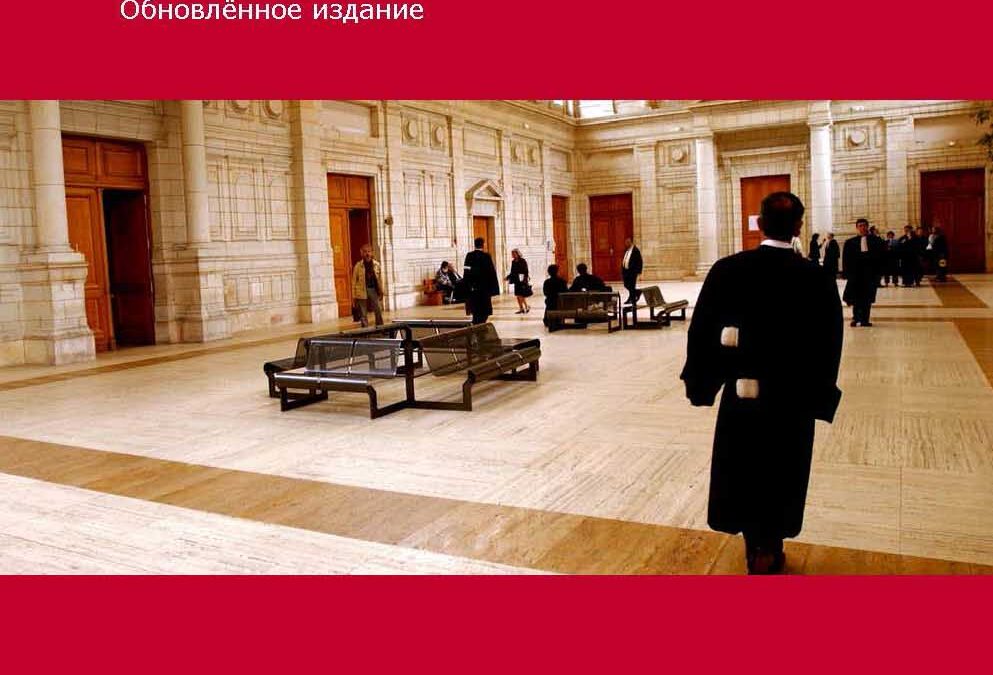
Oct 13, 2016 | News, Publications
The ICJ published today a Russian translation of its Practitioners Guide no. 6 on Migration and International Human Rights Law.
This updated edition of the Practitioners Guide analyses the protection afforded to migrants by international law and the means to implement it at national and international levels.
The ICJ Guide synthesizes and clarifies international standards on key issues, in particular:
- the rights and procedures connected to the way migrants enter a country and their status in the country of destination;
- human rights and refugee law constraints on expulsion;
- the human rights and refugee law rights linked to expulsion procedures;
- the rights and guarantees for administrative detention of migrants;
- rights connected to work and labour; and
- rights to education, to the highest attainable standard of health, to adequate housing, to water, to food, and to social security.
universal-pg-6-migration-publications-practitionners-guides-series-2016-rus (full guide in Russian, PDF)
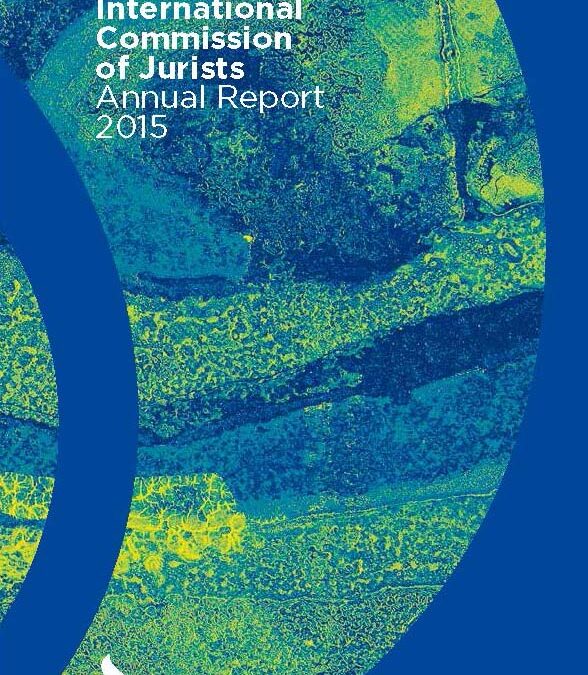
Sep 5, 2016
The ICJ has issued its Annual Report 2015, which offers a concise summary of the work carried out by the ICJ over the past year.
While the ICJ continues to engage with and often lead on the development and implementation of regional and international human rights standards, the ICJ is witnessing an attack on these standards.
Today, there are signs of a global backlash against human rights protections that has gone beyond a reduced government commitment to provide support and has instead, in some quarters, transformed into active hostility to these rights.
Political and economic trends are undermining human rights standards so that millions have become more, rather than less, vulnerable.
Inequality and discrimination are becoming more entrenched. With increasingly narrowing support, this is a difficult time to be operating in human rights protection.
Last year, the ICJ has worked hard to press in the UN and other intergovernmental fora for better protections and clearer standards aimed at ensuring accountability and access to justice for everyone.
The ICJ also continues to be concerned about judicial independence and impropriety and whilst it continues to support the former, it is also concerned where acts of judicial impropriety are rampant, and judges are not held accountable for abuses of judicial position and mis-application of the law that undermines human rights protection.
In 2015, the ICJ continued its work in monitoring the counter-terrorism measures introduced by some States and highlighting issues that raise human rights concerns and it has also focused on the issue of human rights in the digital age.
Last year, the ICJ’s work also continued to focus on the most marginalized groups in society that, already vulnerable to rights violations, are the first to suffer from a weakening of rights protection.
On the issue of enforced disappearances, the ICJ published a new ICJ Practitioners’ Guide on enforced disappearances and extrajudicial executions, available in both Spanish and English.
For a complete overview of ICJ’s most important activities in 2015, you can download the Annual Report 2015 (in PDF) here:
Universal-ICJ Annual Report-Publications-Annual Report-2015-ENG
Universal-ICJ Annual Report low res-Publications-Annual Report-2015-ENG (in low resolution to download faster)
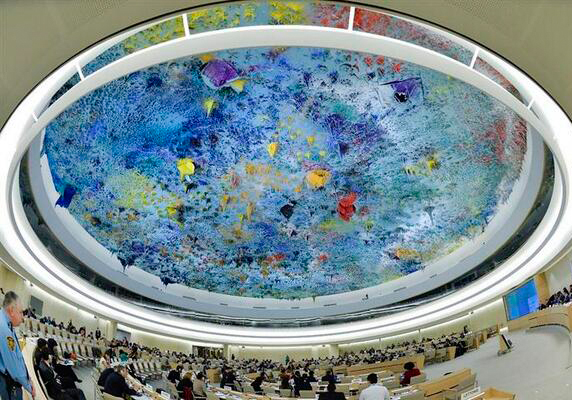
Jun 30, 2016 | News
The United Nations Human Rights Council, in a defining vote, adopted a resolution on 30 June 2016, on “Protection against violence and discrimination based on sexual orientation, and gender identity,” to mandate the appointment of an independent expert on the subject.
It is a historic victory for the human rights of anyone at risk of discrimination and violence because of their sexual orientation or gender identity, a coalition of human rights groups said today. This resolution builds upon two previous resolutions, adopted by the Council in 2011 and 2014.
The Core Group of seven Latin American countries – Argentina, Brazil, Chile, Colombia, Costa Rica, Mexico, Uruguay – and 41 additional countries jointly presented the text.
The resolution was adopted by a vote of 23 in favor, 18 against and six abstentions.
“This is truly momentous,” said Micah Grzywnowicz, of the Swedish Federation for LGBTQ Rights (RFSL). “This is our opportunity to bring international attention to specific violations and challenges faced by transgender and gender non-conforming persons in all regions. It’s time for the international community to take responsibility to ensure that persons at risk of violence and discrimination because of gender identity are not left behind.”
“It’s a historic resolution,” said Josefina Valencia, of the International LGBTI Association for Latin America and the Caribbean, ILGA LAC. “Latin America has played a very important role to build a common course for the advancement of our human rights. We are proud of the international solidarity and the commitment shown by States for equality.”
The positive vote responds to a joint campaign of a record 628 nongovernmental organizations from 151 countries calling on the Human Rights Council to adopt the resolution and create the independent expert.
“It is important to note that around 70 percent of the organizations are from the global south,” said Yahia Zaidi of MantiQitna Network. “This is a powerful cross-regional message of strength to the UN to protect the rights of LGBTI persons. The independent expert will be a focal point for all violations based on SOGI and hence help grassroots organizations to better utilize the otherwise complex labyrinth of the UN system.”
The expert will be tasked with assessing implementation of existing international human rights law, identifying best practices and gaps, raising awareness of violence and discrimination based on sexual orientation and gender identity, engaging in dialogue and consultation with states and other stakeholders, and facilitating provision of advisory services, technical assistance, capacity-building, and cooperation to help address violence and discrimination on these grounds.
“To have an independent expert can be a ‘game-changer’ in counteracting violence which fuels the HIV epidemic in key populations and more specifically in LGBT communities,” said Alain Kra of Espace Confiance.
“It will ease the work of all human rights defenders and it is essential for our governments and people to have the knowledge on how to protect LGBT communities from any violence and discrimination they face,” added Joleen Mataele of the Tonga Leiti’s Association.
Although a number of hostile amendments seeking to introduce notions of cultural relativism were adopted into the text by vote, the core of the resolution affirming the universal nature of international human rights law stood firm.
The International Commission of Jurists believes that the UN Human Rights Council made history by creating a mandate empowering a UN Independent Expert specifically to address human rights violations perpetrated against people in all regions of the world because of discrimination against their real or imputed sexual orientation or gender identity.
Results of the vote
Voting in favor of the resolution
Albania, Belgium, Bolivia, Cuba, Ecuador, El Salvador, France, Georgia, Germany, Latvia, Macedonia, Mexico, Mongolia, Netherlands, Panama, Paraguay, Portugal, Republic of Korea, Slovenia, Switzerland, United Kingdom, Venezuela, Vietnam
Voting against the resolution
Algeria, Bangladesh, Burundi, China, Congo, Cote d’Ivoire, Ethiopia, Indonesia, Kenya, Kyrgyzstan, Maldives, Morocco, Nigeria, Qatar, Russia, Saudi Arabia, Togo, United Arab Emirates
Abstaining on the resolution
Botswana, Ghana, India, Namibia, Philippines, South Africa
Organizations supporting this statement:
- Access Chapter
- AIDES France
- Amnesty International
- ARC International
- Clóset de Sor Juana AC
- Egale Canada Human Rights Trust
- Espacio de Mujeres Lesbianas Salvadoreñas por la Diversidad (ESMULES)
- Federatie van Nederlandse Verenigingen tot Integratie van Homoseksualiteit – COC Nederland (Netherlands)
- Foundation for SOGI Rights and Justice (FORSOGI), Thailand
- FRI, the Norwegian Organisation for Sexual and Gender Diversity
- GALANG Philippines
- GATE – Global Action for Trans* Equality
- Human Rights Law Centre
- Human Rights Watch
- Iranti-org (South Africa)
- International Commission of Jurists
- ILGA LAC, Asociación Internacional de Lesbianas, Gays, Bisexuales, Trans e Intersexuales para América Latina y el Caribe
- International Lesbian, Gay, Bisexual, Trans and Intersex Association (ILGA)
- Lesbians, Gays and Bisexuals of Botswana (LEGABIBO)
- LGBT Denmark – the National Organization for Gay Men, Lesbians, Bisexuals and Transgendered People
- MantiQitna Network
- OutRight Action International
- Pacific Sexual Diversity Network
- Pan Africa ILGA
- Proyecto Arcoiris, colectivo anticapitalista e independiente
- Samoa Faafafine Association
- Swedish Federation for LGBTQ Rights (RFSL)
- TLF Share Collective – Philippines
- Tonga Leitis Association






